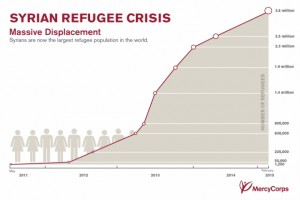Toward a Pentecostal Solution to the Refugee Crises in the European Union
 Rev. Dony K. Donev, M.Div., D.Min.
Rev. Dony K. Donev, M.Div., D.Min.
We saw them everywhere during our ministry trips through Europe. Long columns of dark bearded men, covered women and malnourished, underdressed little children. They fill the refuge villages in Bulgaria near the Turkish border. Many of them were forced to travel in long trains from Austria to Hungary, Germany and all the way to the large Muslim ghettoes of Amsterdam and East Berlin. And even at the Dover side of the English Channel, where tens of miles long truck columns were parked directly on the interstate waiting for the refugees to pass with the ferryboats.
Every minister/missionary should at least wonder about a solution to this largest migration wave of the century. What is the proper human, Biblical approach toward these people regardless if they are persecuted Christians, migrating terrorists or just refugees without a country? What would be the Pentecostal (in the Spirit of Pentecost) response to their fate?
Several outspoken Pentecostal denominations have already raised awareness to the issue with a call for a “Christian assimilation.” Frankly, “assimilation” as an anthropological term is outdated even in the most assimilative cultures in the world. In the United States, once a melting pot of ethnos and cultures, modern day emigration takes terms in creating subcultures. In such cultural setting, assimilation is fairly hard to achieve and quite imperialistic as an approach. It is also not a religious term – the proper faith language being “proselytizing.” Even the Bible states that at the end “every tongue shall confess” picturing a multitude of ethnoses, not merely one assimilated culture. With all this, a call for cultural assimilation on part of Christianity borders a call for crusades, even the thought of which is inapplicable in 21st century’s society.
On the part of Islam, a Muslim subculture allowing assimilation without conflict and resistance will be practically impossible to achieve. And how exactly do you convert with words in a culture that allows speaking only to men? We all know of ministries or missions that have done successful work among Muslims, but what is observed in today’s context of ministry among Muslim migrants is unfamiliar to even experienced missionaries. A Muslim subculture is being created so fast, so vast and so unified throughout European Union countries, that it threatens to assimilate the Christian local host-culture before being assimilated or culturized within Western Christendom. Pentecostal churches throughout Europe are simply not prepared for such challenge, as confirm leaders of “Maranatha Ministries,” the largest Pentecostal church in the Netherlands.
The single greatest challenge is perhaps that the Islamic culture is not like any of the known subcultures in the Western World. While Hispanics focus on their language and Asians accent on their heritage and predecessors, the Islamic subcultures are being centralized around the Sharia Law. The newly forming subculture then is not simply ethnic or heritage oriented, but a legal precedent – often in direct contradiction with the law of the land. How do we engage the Sharia Law mindset with the law of Grace to effectively penetrate with the Message of Salvation such closely guarded culture, will be the answer to this current dilemma of ministry. Although not a complete solution, the following practical steps are much more Christ like and suitable to the situation than a theoretical assimilation, which may prove to be nothing more than a 21st century crusade:
- Fast from your daily Starbucks (Costa, or coffee brand of your choice) for a month. With the money you can sponsor one refugee child out of starvation. The cost is the same, but saving a child tastes much better than java
- Team up with a Pentecostal church in Europe, which is directly working within the refugee camps. It will not be hard to find one as only a few Pentecostal churches in Western Europe are involved in refugee work
- Prayerfully consider going to Europe yourself and contribute your time and resources toward a refugee camp.
European Delights: A Sweet Journey Through Europe
 Cakes, cookies, custards, puddings, candies, fried dough, pies and pastries. From the unconventional, recipes of Albanian Walnut Lemon Cake and Lithuanian Poppy Seed Cookies to the classic Tiramisu and Macaroon recipes, this cookbook takes your taste buds on a sweet journey throughout Europe. Desserts have come a long way since the dried fruits of the ancient civilizations as the first candies to soufflés and cakes once sugar began to be manufactured in the Middle Ages. This cookbook contains some of both the simple and more advanced recipes of Europe. It features 40 authentic dessert recipes representing nearly every European country and with each recipe there is a story to tell. The word “dessert” originated from the French word desservir “to clean the table” and these delights will make you want to clean your table a bit faster.
Cakes, cookies, custards, puddings, candies, fried dough, pies and pastries. From the unconventional, recipes of Albanian Walnut Lemon Cake and Lithuanian Poppy Seed Cookies to the classic Tiramisu and Macaroon recipes, this cookbook takes your taste buds on a sweet journey throughout Europe. Desserts have come a long way since the dried fruits of the ancient civilizations as the first candies to soufflés and cakes once sugar began to be manufactured in the Middle Ages. This cookbook contains some of both the simple and more advanced recipes of Europe. It features 40 authentic dessert recipes representing nearly every European country and with each recipe there is a story to tell. The word “dessert” originated from the French word desservir “to clean the table” and these delights will make you want to clean your table a bit faster.







